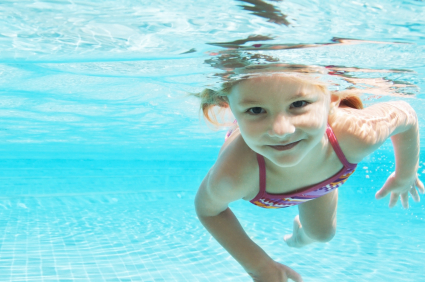 It is gross, but it does occasionally happen: your backyard oasis becomes an accidental bathroom. Fecal matter in the pool water can carry germs and bacteria like E. coli and hepatitis A, or even parasites that can make other swimmers sick.
It is gross, but it does occasionally happen: your backyard oasis becomes an accidental bathroom. Fecal matter in the pool water can carry germs and bacteria like E. coli and hepatitis A, or even parasites that can make other swimmers sick.
Recreational water illnesses are spread most often by swallowing pool water that has been contaminated. One person with diarrhea can easily contaminate the pool — though the water will dilute and distribute the germs, the germs are still present. Chlorine in the pool water does kill most germs that are responsible for water-borne illnesses, but chlorine takes time to work.
How to Remove Poop from the Pool
A formed stool in the water is a much lower risk than a diarrheal accident. With a formed stool, you want to first get everyone out of the water. Carefully remove the floater using a scoop or net — if you can remove the fecal matter without breaking it apart, the chances of pool contamination stay low. Do not use a vacuum to remove the fecal mater from the pool! Dispose of the formed stool in a sanitary manner. Clean and disinfect the scoop. Check the chlorine levels, and raise them to 2.0 parts per million if they are below that level. Check the pH levels, and make sure they are between 7.2 and 7.5 — this combination of chlorine and pH will ensure that your pool is decontaminated within a half hour. The chlorine will kill the majority of the germs as long as the chlorine level stays at 2.0 or higher for at least twenty-five minutes.
Diarrhea in the pool is a much more serious situation. In general, there are more infectious germs in an unformed stool accident than in a formed one. Again, get all swimmers out of the pool immediately. Remove as much of the matter as you can with a net or scoop — do not use a vacuum. Dispose of the mess in a sanitary manner, then clean and disinfect the scoop. Raise the chlorine concentration to 20 parts per million for the next eight hours. This means swim time is over for the day! Keep the pH between 7.2 and 7.5 for the chlorine to be most effective. The extremely high chlorine level will kill most germs and parasites after eight hours. You may want to consult a pool professional before super-chlorinating the water, to make sure your system can handle it.
In a public pool, fecal accidents are recorded in a log — date, time, type, and steps taken to disinfect the water. At home, ask your guests to shower or bathe before coming to swim… and remind your friends that swimming when ill with diarrhea is a very unhealthy thing to do!

